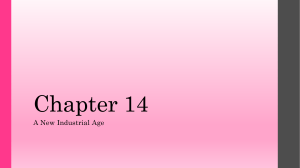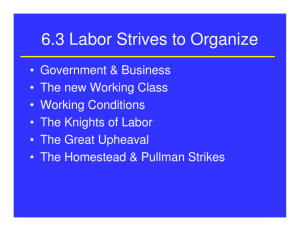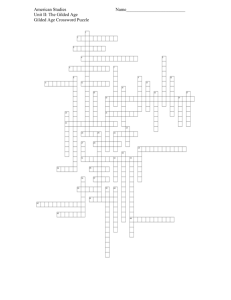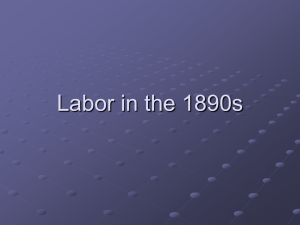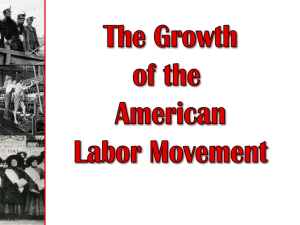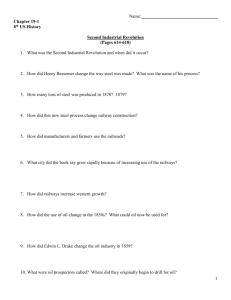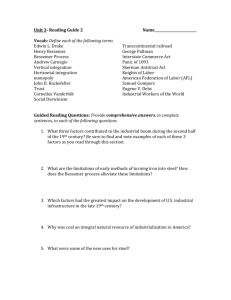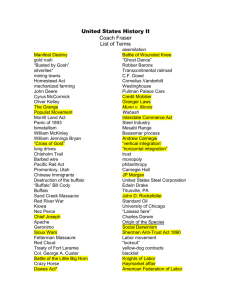Capital_v_Labor
advertisement
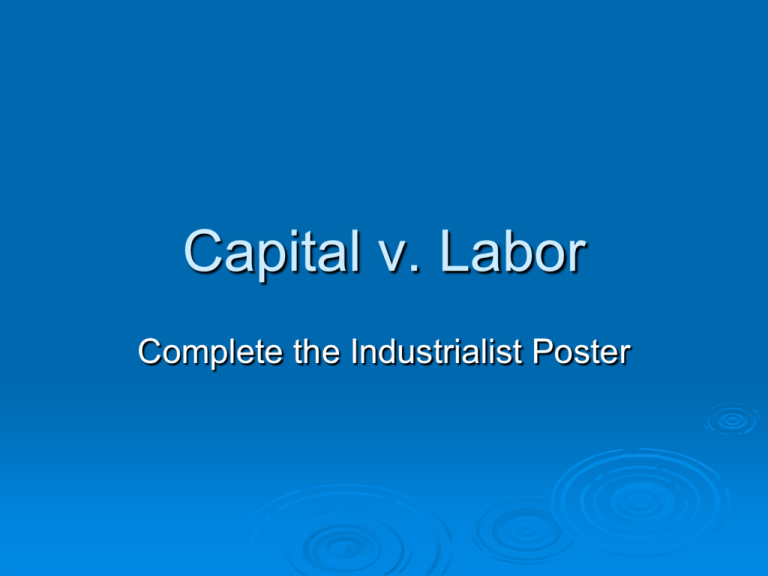
Capital v. Labor Complete the Industrialist Poster Warm Up As students at Woodstock North High School what would be some things you would change about the school, and your freedoms? Talk How with a partner and jot down 5 items. would you get these demands that you are seeking? Laissez Faire Economics “Leave Gov’t it alone” should stay out of business Businesses benefit = society benefits Social Darwinism (Herbert Spencer) Charles Darwin’s theory of evolution applied to humans/society “Only the strong survive” Andrew Carnegie *Entrepreneur A person who starts a business Steel “Gospel of wealth” – use wealth to help society "Millionaires are the bees that make the most honey and contribute most to the hive even after they have gorged themselves full.” --Andrew Carnegie Andrew Carnegie (cont’d) Vertical Consolidation = gain control of all phases of product development John D. Rockefeller Standard Oil Co. Horizontal Consolidation = creation of 1 giant business from buying many smaller ones Monopolies, Cartels, and Trusts Monopoly = the sole supplier of a product with no substitute Cartel = secret associations of businesses making the same product Trust = several businesses run by a board of trustees Captains of Industry or Robber Barons? Captain of Industry Positive view Made U.S. great! Improvements helped us all Philanthropist = charitable person Robber Baron Negative view Wealth ONLY concern Unfairly used power to cut our competition Socialism Socialism a theory or system of social organization that advocates the vesting of the ownership and control of the means of production and distribution, of capital, land, etc., in the community as a whole. -Webster’s dictionary Founded by Karl Marx and German Philosopher Why would people be interested in socialism, during this time? Early Labor Unions Initially - to help members in bad times Soon -means to gain better working conditions bargaining – union negotiates with employers Collective Yellow dog contracts - signed by employees, promise to never join a union Knights of Labor 1869 Goal to organize ALL workers into 1 union Recruited women and Afr. Am.s Concerns: Equal pay for equal work 8 hour day End child labor The American Federation of Labor (AFL) 1886 – Samuel Gompers Goal - organize ONLY skilled workers In practice opposed women and Afr. Ams. Advocated “closed shop” Concerns Wages/Hours Working conditions The Great Strike of 1877 B & O Railroad (July 1877) Shut down 50,000 miles of track Federal Government (Cleveland) sent in federal troops to end the strike Haymarket Riot May 4, 1886 3,000 strikers gathered in Haymarket Square in Chicago Protesting police brutality from McCormick Harvester plant A bomb was thrown at the police Police opened fire 7 police and several workers died After the event the public turned against the labor movement Homestead (1892) Carnegie Steel (U.S. Steel) Homestead, PA Laborers Laborers just settled a labor contract Henry Frick cut wages shortly after Created Unions Began a strike against Frick Frick’s reaction Pinkertons – a specialized strikebreaking private police force Gunfire broke out, police and strikers were killed Pullman (1894) George Pullman – Railroad car producer Created a factory town just outside of Chicago to house his workers 1893 – Depression 25 - 40% unemployment in the town wages bottom out. Rent for housing remains the same. Eugene V. Debs – Labor organizer during the period Pullman workers created a union they strike Result of Pullman Strike Pullman Strike Pullman went to the federal government and sighted the interference in the mail delivery Federal government ruled in favor of Pullman and sent U.S. troops Result – twelve strikers lay dead and the strike was broken Final Anarchy Anarchy a theory that regards the absence of all direct or coercive government as a political ideal and that proposes the cooperative and voluntary association of individuals and groups as the principal mode of organized society. - Webster’s Dictionary Why would people be in favor of anarchy, during this time?
